Slavic, East European, and Eurasian Studies
Library Trial of Russian Imperial Era Periodicals: a Bibliography and Reference Guide (ImPressDB)
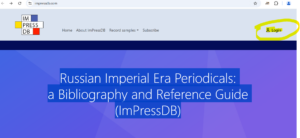
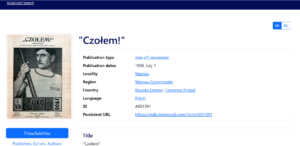
Russian Women Writers Project Completed
At UC Berkeley Library, with the leadership and guidance from the library’s current acting AUL for Associate University Librarian for Digital Initiatives and Information Technology, Lynne Grigsby, we are excited to report the completion of the Russian Women Writers Collection’s digitization. The collection’s analog items can be searched here.
The digital component of the project can be accessed here.
My predecessor, Dr. Allan Urbanic, was instrumental in helping us with the description of the project, which is as follows, “Russian Women Writers Collection
This project has been created in cooperation with the Russian National Library in St. Petersburg. In recent years, scholarship has focused on women’s contributions to the history of Russian literature. It has also been discovered that many of these writers were poorly represented in American libraries’ collections. The project first concentrated on filling in the corpus of women writers at the beginning of the 19th century. As the project moved forward, the works of Russian women authors of the later 19th century and the 20th century have been added.”
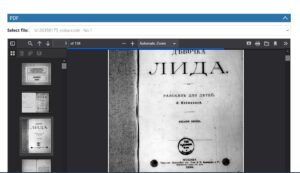
Terms governing use and reproduction
Researchers may freely and openly use the UC Berkeley Library’s digitized public domain materials. However, U.S. copyright law may protect some materials in our online collections (Title 17, U.S.C.). Use or reproduction of materials protected by copyright beyond that allowed by fair use (Title 17, U.S.C. § 107) requires permission from the copyright owners. The use or reproduction of some materials may also be restricted by terms of University of California gift or purchase agreements, privacy and publicity rights, or trademark law. Responsibility for determining rights status and permissibility of any use or reproduction rests exclusively with the researcher. Please see our permissions policies to learn more or make inquiries (https://www.lib.berkeley.edu/about/permissions-policies).
Source
Russian Women Writers
One can look at the usage data of the item called Di͡evochka Lida razskaz dli͡a di͡eteĭ as shown below,

Library Trial: Muslim in Russia Online (Brill Database)
UC Berkeley Library has set up a trial of Brill’s Muslim in Russia Online Database. The database trial will continue until February 1, 2025. You can access the trial here.
This collection examines the varied Russian Muslim population during the period of 1861-1918. It includes works by and about Muslims, highlighting the significance of this heritage as the history and spirituality of Muslims in Russia are being reexamined. A word of caution: Most of the periodicals in this database have been digitized from microfilms; thus, digitization quality is problematic. The OCR seems unchecked and automated “dirty,” so one has to look at the images.
Please access the database here: https://shorturl.at/M4IyT
Please see the screenshot below:
![Title: V mīri͡e musulʹmanstva:ezhenedelʹnai͡a, literaturnai͡a, politicheskai͡a i obshchestvennai͡a gazeta.<br />Date: 1911<br />
Date in Source: [1911-1912]](https://update.lib.berkeley.edu/wp-content/uploads/2025/01/Screenshot-2025-01-08-105604.jpg)
Date: 1911
Date in Source: [1911-1912]
Here are the key points about this database are highlighted below:
- Role in Russian State: Muslims played a crucial role in the creation of the multinational Russian state, completed with the annexation of Central Asia in the 1860s. By 1897, Muslims made up almost 11% of Imperial Russia’s population (14 million).
- Russian State Policy: Russian policy towards Muslims varied. Initially, there was forced Russification and Christianization. From Ekaterina II onwards, the policy shifted towards legitimizing Muslims. Under Alexander III, discrimination against non-Christians, including Muslims, increased.
- Early 20th Century: The early 1900s saw a rise in Muslim nationalism, fueled by religious reformism and liberal ideas. The First Russian Revolution (1905-1907) led to significant political changes, including creating the State Duma and civil freedoms.
- Union of Muslims of Russia: Formed in 1905-1906, this organization became the most powerful political body for Muslims until 1917, with branches across various regions.
- Intellectual and National Identity: Early 20th century saw more Muslim intellectuals and interest in national identity, heritage, and traditions.
- 1917 Revolutions: Muslim nationalist movements grew during the February and October Revolutions of 1917. Post-1917, Bolshevik policies negatively impacted Muslims’ religious freedoms.
- Muslim Press: Until 1905-1907, Muslim issues were poorly reported. The 1905 revolution led to a surge in Muslim publications. These periodicals covered a range of ideological perspectives and helped address Muslim problems.
- Unique Publications: Publications from 1861-1918 provide insights into Muslim life in the Russian Empire and their leaders’ perspectives. These works are valuable for understanding Muslims’ historical and spiritual heritage in Russia.
Library Book Talk (Webinar): On Savage Shores: How Indigenous Americans Discovered Europe
Please save the date on your calendars for an exciting upcoming conversation-book talk (On Savage Shores : How Indigenous Americans Discovered Europe) for our community of UC Berkeley Library and affiliated staff and librarians.
Date: February 6, 2024
Day: Thursday, Time: 12-1 pm (Pacific Time) 8 pm-9 pm UK Time
Zoom Webinar Link: https://berkeley.zoom.us/webinar/register/WN_LGoU0V9ZQXegc5fHxlF_WA
Registration: https://ucberk.li/3GW
Free and Open to All with prior registration. If you need special assistance or accommodation, please contact Dr. Liladhar R Pendse, the event organizer.
About the Webinar: In this webinar, Professor Caroline Dodds Pennock (She/her) will discuss her book, On Savage Shores: How Indigenous Americans Discovered Europe. This book challenges the traditional Eurocentric view of the Age of Discovery by focusing on the Indigenous Americans who crossed the Atlantic to Europe after 1492. For centuries, history has taught that global history began when the “Old World” met the “New World” with Columbus’ arrival in the Americas. However, Caroline Dodds Pennock’s research reveals that, for many Indigenous people—Aztecs, Maya, Totonacs, Inuit, and others—Europe was the “New World.”
![A Collage of pages of Codex Mendoza. The Codex Mendoza is an Aztec codex, believed to have been created around the year 1541.[1] It contains a history of both the Aztec rulers and their conquests as well as a description of the daily life of pre-conquest Aztec society. The codex is written using traditional Aztec pictograms with a translation and explanation of the text provided in Spanish. It is named after Don Antonio de Mendoza (1495-1552), the viceroy of New Spain, who supervised its creation and who was a leading patron of native artists.](https://update.lib.berkeley.edu/wp-content/uploads/2025/01/imgonline-com-ua-twotoone-Ddaw07KdHVpPXVF-scaled.jpg)
About the author
Professor Caroline Dodds Pennock (She/her) has been at the University of Sheffield since 2010, where they are known as one of the few British historians specializing in Aztec studies. Their current research, however, has expanded to include Indigenous histories in a global context, with a particular focus on the Atlantic world. Dr. Caroline Dodds Pennock recently published On Savage Shores: How Indigenous Americans Discovered Europe, which tells the stories of Indigenous Americans who traveled to Europe in the sixteenth century. These accounts, often involving abduction, loss, and cultural appropriation, have largely been overlooked in mainstream history.

Dodds Pennock, Caroline. On Savage Shores : How Indigenous Americans Discovered Europe / Caroline Dodds Pennock. First American edition. New York: Alfred A. Knopf, 2023.
https://search.library.berkeley.edu/permalink/01UCS_BER/1thfj9n/alma991086032106106532
Event Sponsors: Social Sciences Division. Library’s Equity and Inclusion Committee, Institute for European Studies, UC Berkeley and Center for Latin American and Caribbean Studies (CLACS), UC Berkeley
Library Trial: Piatidnevka Digital Archive (DA-PIAT) through December 5, 2024
The UC Berkeley Library has started a trial of Piatidnevka Digital Archive. The trial will end on December 5, 2024. Please provide your feedback to your Librarian for Slavic, East European and Eurasian Studies at Lpendse at berkeley dot edu
The Piatidnevka Digital Archive is a valuable resource for researchers studying early Soviet history, particularly between 1929 and 1931. Published six times a month, this journal documents the Soviet Union’s brief experiment with a five-day workweek. The archive provides insight into the Soviet goal of replacing traditional societal norms with innovative approaches. It contains a wealth of visual and textual materials, including photographs, articles, editorials, and commentaries that offer firsthand perspectives on this significant period.
The trial can be accessed here.
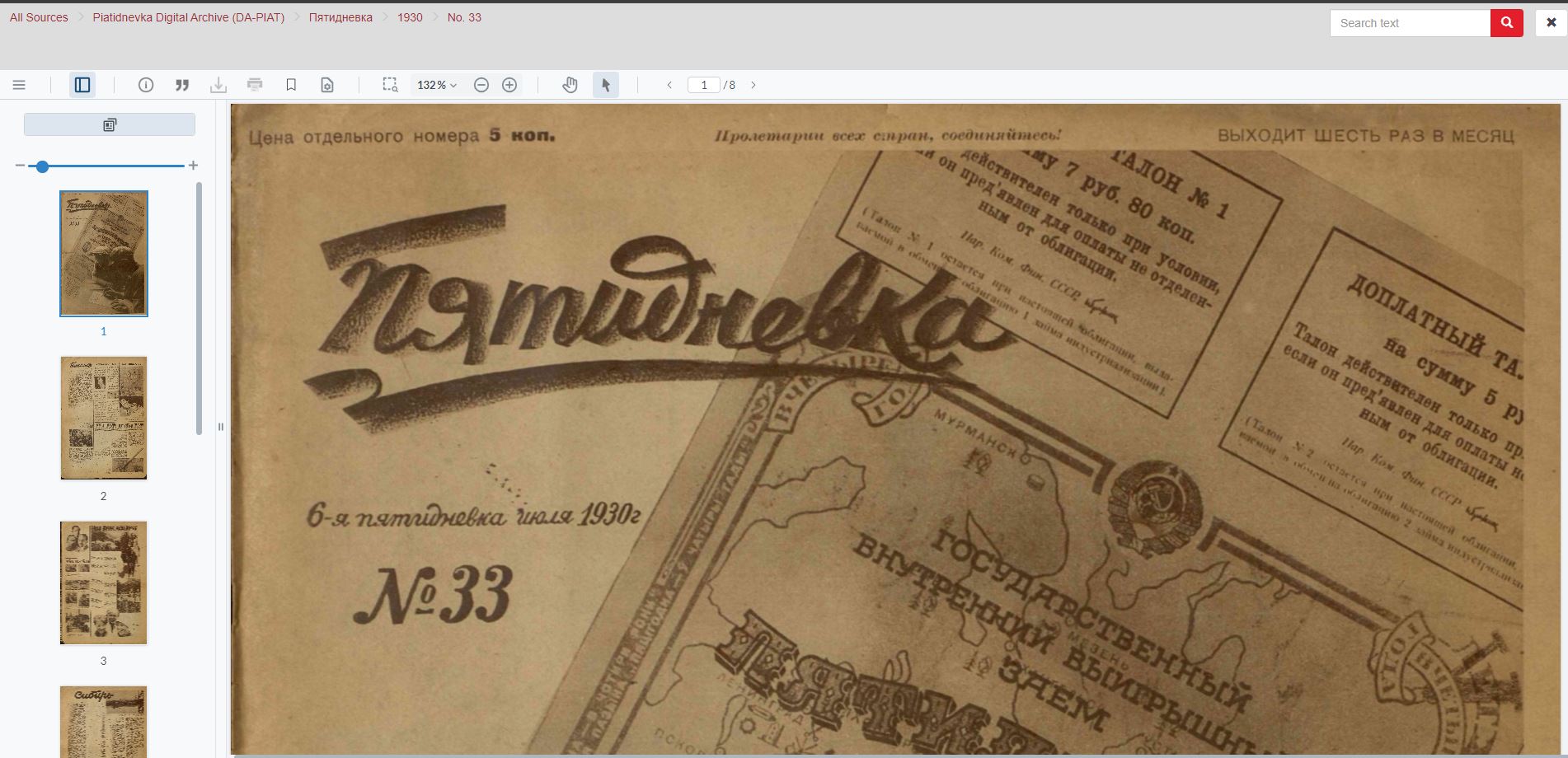
Library Trial: Brill’s British Intelligence on Russia in Central Asia, c. 1865–1949
The UC Berkeley Library has initiated a thirty-day trial of British Intelligence on Russia in Central Asia, c. 1865–1949’s database. The trial ends on November 17, 2024
One may access the trial here: Brill’s British Intelligence on Russia in Central Asia.
Please log in using proxy or VPN if you are accessing the resource from an off-campus location.
The database contains the following primary sources according to the self-description below, ”
Michell’s Russian Abstracts
During the 1870s and 1880s, the India Office Political and Secret Department considered the Russian and Central Asian question so vital that it employed an interpreter, Robert Michell, whose task was to review and translate Russian printed reports and extracts from Russian newspapers and other publications. Newspapers and journals regularly monitored included the Moscow Gazette, Turkestan Gazette, Journal de St Petersbourg, Russian Invalid, St Petersburg Gazette, Golos, Turkestan Gazette, and Novoye Vremia.
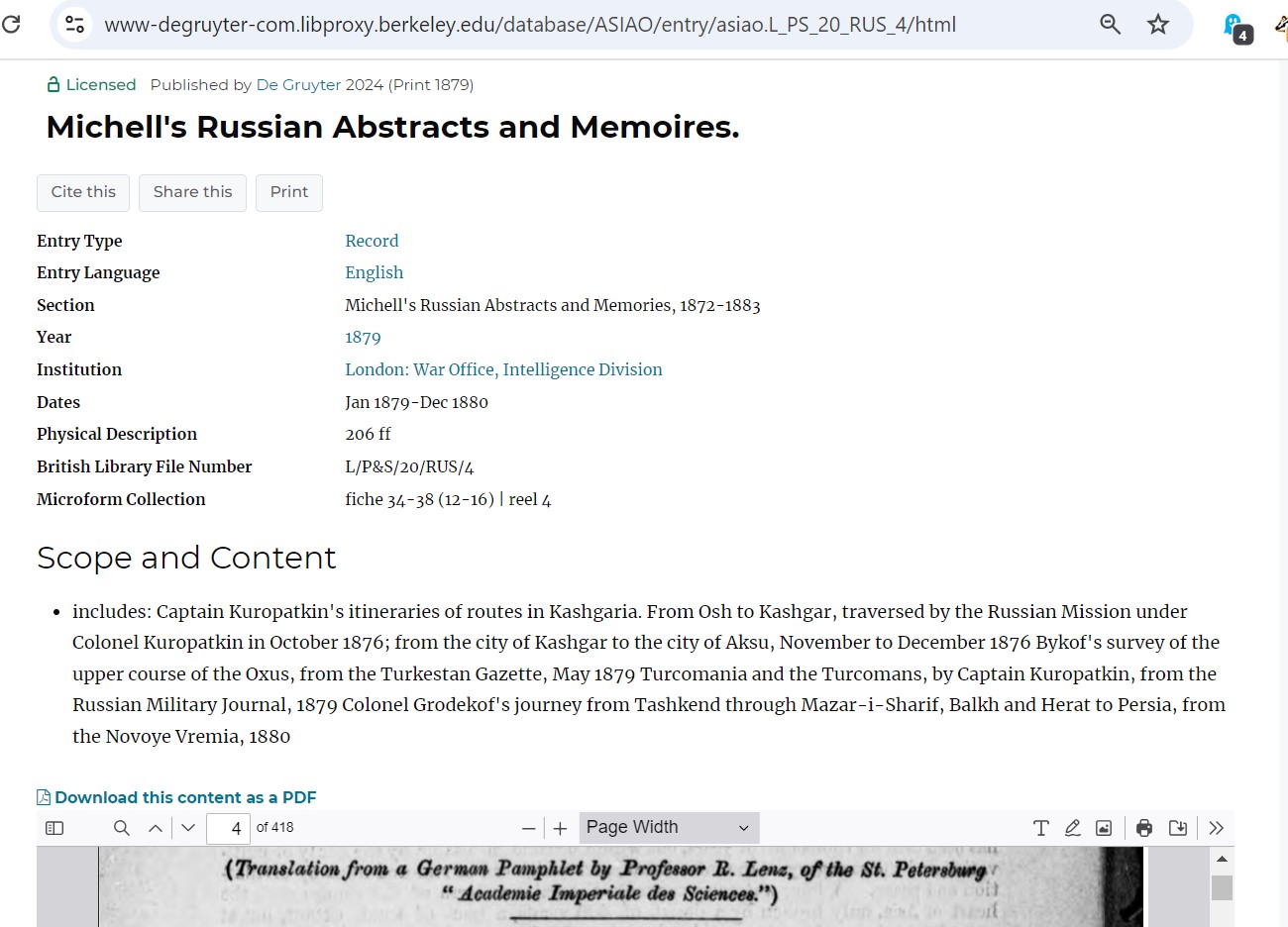
Michell’s Russian Abstracts and Memories, 1872-1883
Year
1879
Institution
London: War Office, Intelligence Division
Political and Secret Memoranda
At about the same time, as a result of the increasing quantity of intelligence now being regularly received, the India Office Political and Secret Department began to produce printed memoranda in order to provide ministers with easily digestible précis of the information they needed to formulate policy. For officials in India and London, processing information from the frontiers and providing background papers for successive incoming governments and their ministers became an almost full-time occupation. The Memoranda was arranged and numbered by contemporary India Office officials in an alphanumeric sequence that reflected the geographical subject area. Memoranda relating to Central Asia, which included items reflecting the great political debate and guessing game over the nature of Russian intentions in the region, were usually put away in series “C”.
Political and Secret Files on Soviet Central Asia
Although Anglo-Russian rivalry officially ended with the Convention of 1907, Russian ascendancy in Central Asia continued to interest the British imperial administrations. The two powers confronted each other again after the First World War and the Russian Revolution. With the creation of Soviet Socialist Republics in the period between the two World Wars, the British rulers of India were increasingly concerned with infiltrating Indian politics of communist and nationalist agents and ideas. During this period, a new generation of British military and political intelligence officers, spies, and adventurers made courageous, sometimes unofficial, journeys into the Central Asian republics and beyond into Sinkiang. A British Indian agent was stationed at Kashgar in 1893, but 1911 the post was upgraded to Consulate-General. Kashgar became the listening post and source of regular intelligence briefings, political diaries, and trade reports.
Provenance and Archival Background
The archives of the India Office Political and Secret Department (and Military Department) form part of the Oriental and India Office Collections (OIOC) now within the Asia, Pacific, and Africa Collections at the British Library. The Political and Secret Department papers and printed material have now been catalogued under the OIOC reference L/PS. Military Department papers are located under the reference L/MIL.
Save the date: October 17, 1 p.m. PDT: Navigating Identity, Belonging, and Citizenship: A Conversation with Professor Canizales (Webinar)
Thursday
Oct. 17, 2024
1 p.m. PDT
Zoom
Navigating Identity, Belonging, and Citizenship: A Conversation with Professor Canizales
In this webinar, Stephanie L. Canizales, Ph.D., will discuss her new book, Sin Padres, Ni Papeles, which explores the complex experiences of unaccompanied young migrants from Central America and Mexico in the United States. Canizales illuminates the long history of this migration and how young migrants find meaning and demonstrate resilience in the face of significant adversity.
Free and open to the public
The event will be recorded for archival purposes.
Register at
Sponsors
Berkeley Interdisciplinary Migration Initiative
Institute of Governmental Studies
Latinx Research Center
UC Berkeley Library
Professor Stephanie L. Canizales
Stephanie L. Canizales, Ph.D.
Assistant Professor
Sociology Department
UC Berkeley
Faculty Director
Berkeley Interdisciplinary Migration Initiative
Accessibility accommodations
If you require an accommodation to fully participate in this event, please contact Liladhar Pendse at lpendse at berkeley.edu or 510-768-7610 at least 7-10 days in advance of the event. Organizer: Dr. Liladhar R. Pendse
Available in an alternate format
To request an accessible version of this document, please contact the Library Communications Office at librarycommunications@berkeley.edu.
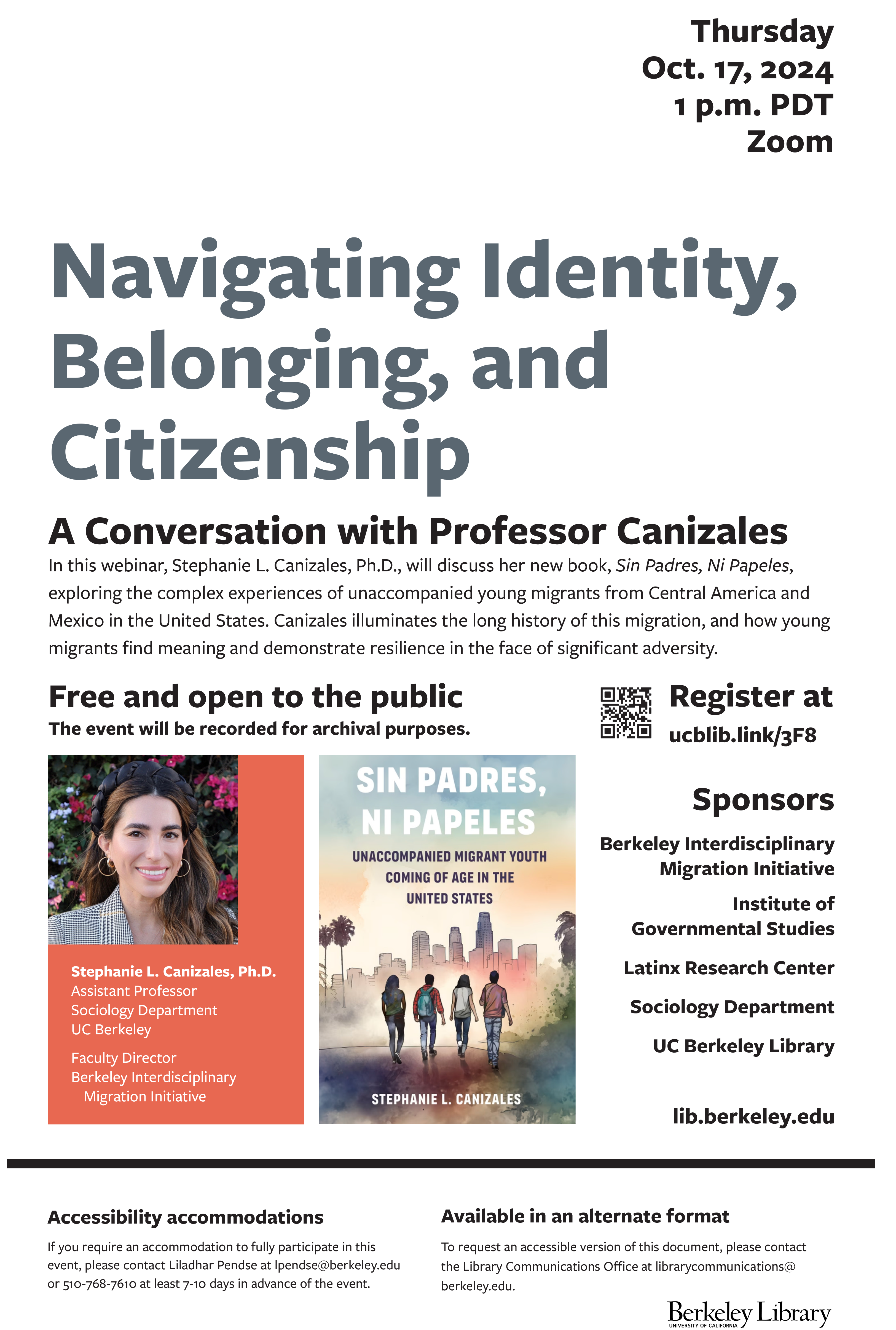
Library Trial of Illiustrirovannaia Rossiia Digital Archive (1924-1939)
The UC Berkeley Libraries have started a trial of the East View database Illiustrirovannaia Rossiia Digital Archive (1924-1939). The trial can be accessed here.
The access is valid through October 24, 2024. If you are accessing it from an off-campus location, please use the VPN or Proxy. For more information on setting up your off-campus access, see here.
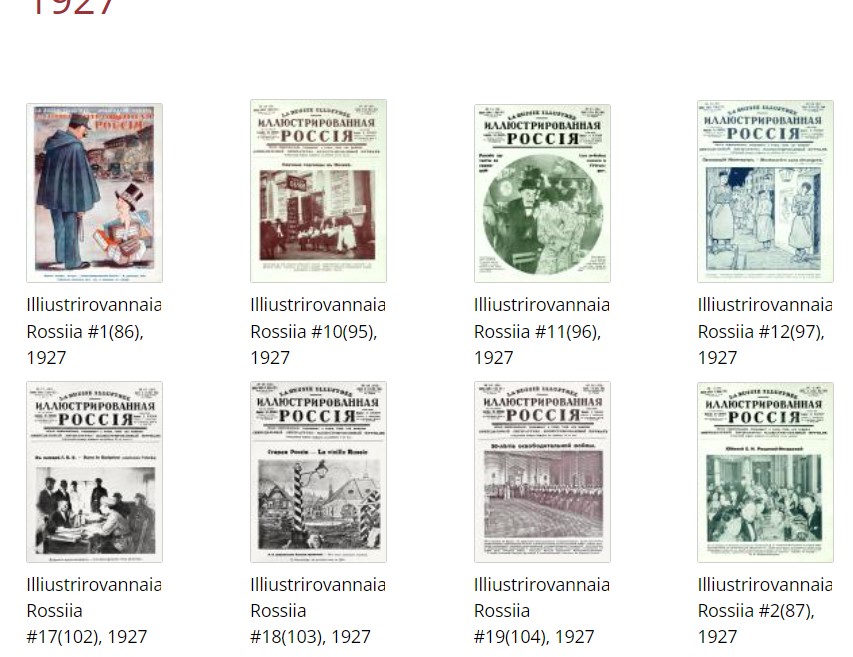
About the journal:
Illiustrirovannaia Rossiia was a literary and illustrated weekly magazine published in Paris from 1924 to 1939. The journal was aimed mainly at the growing community of Russian immigrants who had left Russia after the Bolshevik Revolution. Thus, Illiustrirovannaia Rossiia offers a unique fund of linguistic and visual representations, providing an indispensable insight into Russian cultural life in exile.
The Illiustrirovannaia Rossiia Digital Archive offers this influential journal’s exhaustive and meticulously digitized collection. This archive is an indispensable research resource with 748 issues and over 21,000 pages.
Key features include:
Comprehensive page-level digitization
Faithful reproduction of original graphics
Enhanced search capabilities
Seamless cross-searching with East View’s extensive digital portfolio
Library Trial: Brill’s Cuban Culture and Cultural Relations, 1959-, Part 4: Music
The Library is currently trialing Brill’s Cuban Culture and Cultural Relations, Part IV: Music until October 14, 2024. The database can be accessed here.
This primary source collection documents the history of music in Latin America and the Caribbean, with a special focus on Revolutionary Cuba. It explores the role of music in society and covers festivals, performances, trends, and persons (musicians, composers, producers, etc.). The collection is scanned from the so-called “vertical archive” at Casa de las Américas in Havana, Cuba (source: Brill)
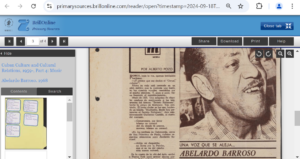
Localidad: Cuba
Resumen: Entrevista al sonero cubano. Publicada en Bohemia.
Coleccion: Colección Archivo Vertical
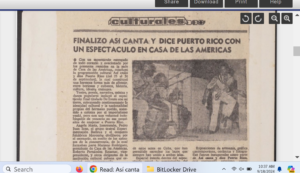
Please use ez proxy or VPN if you are accessing the resource from an off-campus location. Please provide your feedback to your Librarian of the Caribbean and Latin American Studies at Lpendse (at) berkeley (dot) edu
Please access the resource here.
Armenian Studies: Jennifer Manoukian’s Lecture: Forbidden Attraction: Ottoman Armenians and the Turkish Language in the Age of Nationalism
Jennifer Manoukian, UC President’s Postdoctoral Fellow, Department of History (Center for Armenian Studies), University of California, Irvine, will visit the Berkeley campus in September.
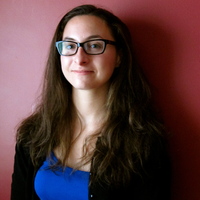
University of California, Irvine, History, Post-Doc
On Wednesday, September 11th, Manoukian will give her talk at the Department of Middle Eastern Languages and Cultures
5:00 pm – 6:30 pm
Lecture and Discussion (254 Social Sciences Building)
Forbidden Attraction: Ottoman Armenians and the Turkish Language in the Age of Nationalism
“This presentation excavates the varied attitudes toward Turkish among Ottoman Armenians in the nineteenth century. It seeks to correct a fundamental misunderstanding about the relationship between Ottoman Armenians and the Turkish language, to reframe Ottoman Armenians as agents in their use of Turkish, and to expose Turkish as something far more than a “language of the oppressor” for many Armenians in the Ottoman Empire. The presentation begins by offering an overview of Ottoman Armenian Turcophonia. It examines three language attitudes that led bilingual Ottoman Armenian men in Istanbul to choose Turkish over Armenian in specific social contexts (source: https://events.berkeley.edu/melc/event/262339-forbidden-attraction-ottoman-armenians-and-the)
The event has been sponsored by the Department of Middle Eastern Languages and Cultures, UC Berkeley, and the University of California President’s Postdoctoral Fellowship Program.